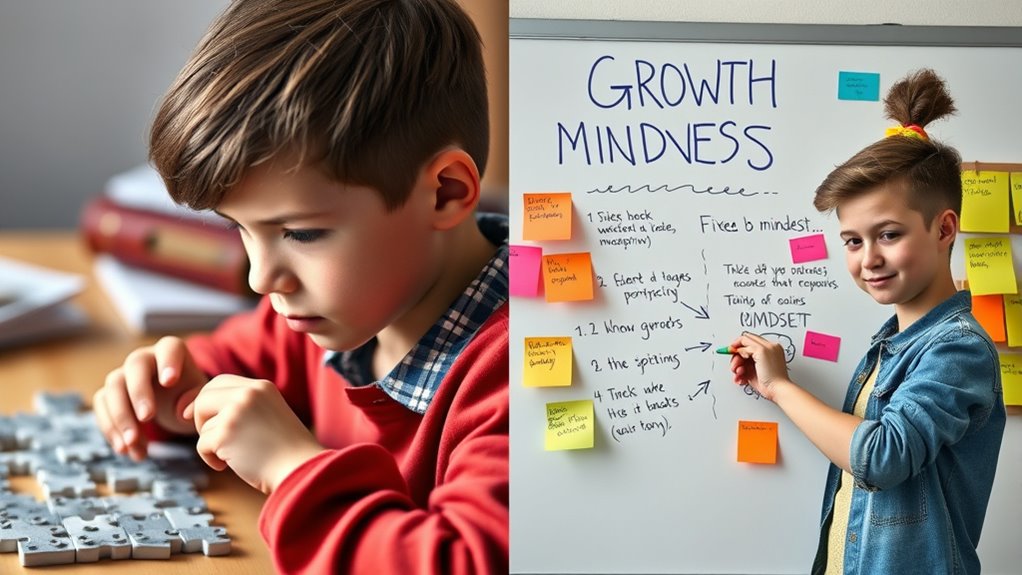In practical terms, a growth mindset means you see setbacks as chances to learn and improve, embracing challenges and viewing mistakes as valuable lessons. You’ll recognize fixed mindset signs like defensiveness or frustration and work to manage these feelings. By surrounding yourself with growth-minded people, setting measurable goals, and celebrating progress, you build resilience. If you keep exploring, you’ll discover more ways to shift your mindset and turn challenges into opportunities for success.
Key Takeaways
- Embrace challenges as learning opportunities to foster a growth mindset, while fixed mindset individuals may avoid difficult tasks.
- Use setbacks as feedback for improvement, encouraging resilience and continuous development.
- Celebrate effort and progress, not just innate talent, to reinforce a growth-oriented approach.
- Provide constructive feedback focused on effort and strategies rather than fixed abilities.
- Regularly assess progress and set new goals to sustain motivation and demonstrate growth potential.
Recognizing Your Mindset in Daily Challenges

Noticing how you respond to daily challenges can reveal whether you have a growth or fixed mindset. When faced with setbacks, observe your self-awareness: do you view mistakes as opportunities to learn, or do you see them as failures? Emotional intelligence plays a key role here, helping you recognize and manage your emotions in stressful moments. If you notice feelings of frustration or defensiveness, it might indicate a fixed mindset, resistant to change. Conversely, acknowledging these emotions without judgment demonstrates openness and a willingness to grow. By paying close attention to your reactions and emotional responses, you develop deeper self-awareness, which is essential for cultivating a growth mindset. Recognizing these patterns is the first step toward shifting your perspective. Water-based techniques like aquatic exercises can also serve as effective tools for managing stress and fostering a positive mindset.
Strategies to Cultivate a Growth Perspective

To cultivate a growth perspective, start by intentionally embracing challenges as opportunities to learn rather than obstacles to avoid. This belief transformation shifts your focus from fixed limitations to possibilities for development. Developing mindset awareness helps you recognize when you’re slipping into a fixed mindset and actively choose a growth-oriented response. Practice reframing setbacks as valuable lessons, which reinforces your commitment to growth. Regularly reflect on your progress and celebrate small wins to build confidence. Surround yourself with growth-minded people who inspire continuous learning. Set specific goals that push your comfort zone, and view mistakes as essential steps in your development process. Additionally, understanding the expiration of vape juice can help you maintain safe and fresh supplies, reinforcing the importance of good habits in your overall growth journey. These strategies reinforce your belief that effort and perseverance lead to improvement, fostering a resilient, growth-oriented outlook.
Overcoming Obstacles With a Resilient Attitude

Building on your efforts to develop a growth mindset, cultivating resilience is key when facing obstacles. Your self-talk plays a crucial role in shaping your emotional resilience; replacing negative thoughts with empowering ones helps you stay focused and motivated. When setbacks occur, remind yourself that challenges are opportunities to learn and grow. Maintaining a resilient attitude means acknowledging your feelings without letting them overwhelm you, and viewing failures as temporary hurdles rather than permanent roadblocks. This mindset fosters emotional resilience, allowing you to bounce back faster and keep moving forward. Incorporating positive self-talk techniques can further enhance your ability to overcome setbacks. By practicing positive self-talk and embracing setbacks as growth moments, you strengthen your ability to overcome obstacles with confidence and perseverance.
Encouraging Growth Mindset in Others

Encouraging a growth mindset in others starts with your own example. When you demonstrate perseverance and embrace challenges, you inspire others to do the same. Use positive reinforcement to acknowledge effort, progress, and resilience, rather than just outcomes. This approach helps others see mistakes as opportunities to learn rather than failures. Provide effective feedback that is specific, constructive, and focused on the process, not just the result. Highlight what they did well and suggest ways to improve, fostering confidence and a desire to grow. Your attitude and communication set the tone, making others feel supported and motivated to develop a growth mindset. Consistently modeling these behaviors encourages a culture of continuous learning and resilience. Incorporating positive reinforcement strategies can significantly enhance motivation and confidence in others.
Measuring Progress and Reinforcing Positive Change

Tracking progress is essential for maintaining motivation and reinforcing positive change. It helps you see how far you’ve come and where to improve. Use self-assessment tools regularly to gauge your growth and identify areas needing attention. Feedback mechanisms are also crucial; seek constructive feedback from others to gain new perspectives. To effectively measure progress, consider these strategies: 1. Set clear, measurable goals and review them periodically. 2. Use self-assessment tools to track skills, mindset shifts, and achievements. 3. Incorporate feedback from mentors, peers, or performance reviews to reinforce positive change. Monitoring contrast ratio improvements can provide a more detailed understanding of your progress in visual quality.
Frequently Asked Questions
How Does Mindset Impact Long-Term Career Success?
Your mindset greatly impacts your long-term career success. A growth mindset encourages resilience building and continuous skill development, helping you bounce back from setbacks and embrace challenges. By viewing failures as opportunities to learn, you position yourself for ongoing improvement. This proactive approach fosters adaptability, enhances your confidence, and opens doors for advancement, ultimately leading to sustained success in your career.
Can Mindset Shifts Influence Physical Health Outcomes?
Your mindset is like a garden; tending it can grow health and resilience. When you embrace a positive outlook, you activate neuroplasticity benefits, rewiring your brain for healthier habits. This shift boosts stress resilience, helping you handle life’s challenges better. By changing your thoughts, you can influence physical health outcomes, improving everything from immune function to energy levels. Your mindset truly has the power to shape your well-being in profound ways.
What Role Does Culture Play in Mindset Development?
Cultural influences and societal norms profoundly shape your mindset development. They influence how you perceive challenges, growth, and failure. In some cultures, effort and perseverance are celebrated, fostering a growth mindset, while others may emphasize innate ability, supporting a fixed mindset. By understanding these cultural influences, you can consciously choose to adopt a more positive outlook, embracing learning and resilience regardless of societal expectations.
How Do Parents Effectively Promote a Growth Mindset at Home?
So, you want to turn your kid into a future Einstein with just a few parenting strategies? Start by praising effort, not just results—because calling your child “smart” might just turn their brain into a fragile glass ornament. Use praise techniques that emphasize perseverance and learning from mistakes. Encourage curiosity, celebrate small wins, and remember: a growth mindset thrives on your unwavering belief that skills can be developed.
Are There Age-Related Differences in Adopting a Growth Mindset?
You might notice that age development influences how easily you adopt a growth mindset, as younger individuals tend to be more open to learning and change. As you grow older, you may face challenges in embracing new skills, but lifelong learning can help you stay adaptable. Recognizing these age-related differences allows you to tailor your approach, fostering a growth mindset at any stage and continually encouraging personal development.
Conclusion
By embracing a growth mindset, you empower your evolution, energize your efforts, and erase barriers. Remember, resilience and reflection foster future feats, fueling your fearless forward flow. Keep cultivating curiosity, conquering challenges, and encouraging others to embody this empowering perspective. With consistent commitment, you’ll continually chase challenges, cherish changes, and celebrate your soaring success. Stay steadfast, stay spirited, and let your growth mindset guide you to greatness!









